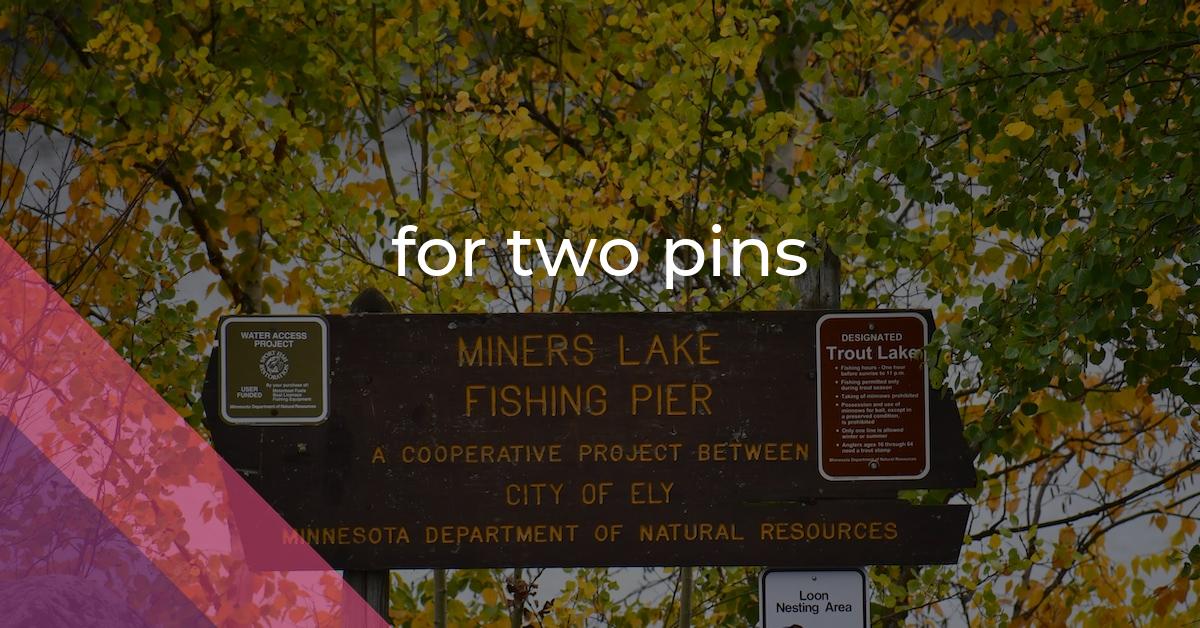for two pins: Idiom Meaning and Origin
What does ‘for two pins’ mean?
The idiom "for two pins" means being willing or ready to do something, even if there is little or no incentive or desire. It implies a low value or importance placed on the action or outcome.

Idiom Explorer
The idiom "kill two birds with one stone" means to accomplish two tasks simultaneously or to achieve two goals with a single action or solution.
The idiom "it takes two to tango" means that a successful outcome or activity requires the participation and cooperation of more than one person.
The idiom "it takes two to make a quarrel" means that both parties involved are equally responsible for a dispute or argument.
An idiom frequently used is "in two shakes", which means to happen quickly or without much delay. This phrase is often used to express the speed at which something can be done or accomplished.
The idiom "in for the kill" is used to describe a situation where someone is determined to achieve their goal and will do whatever it takes to succeed.
The idiom "in for it" means to be in trouble or about to face negative consequences for one's actions or behavior.
The idiom "in for an inch, in for a mile" means that if you are already involved or committed to a small task or action, you might as well go all the way and commit fully to a larger task or action.
The idiom "in for a penny, in for a pound" means that once you commit to doing something, you might as well fully commit and go all the way, regardless of the cost or consequences.
The idiom "in for a dime, in for a dollar" means that once you commit to something, you are fully committed and have to see it through to the end, regardless of the consequences or risks involved.
The idiom "hit two targets with one arrow" means to achieve two goals or objectives with a single action or effort.
Decoding the secret
The idiom "for two pins" is a commonly used expression in the English language. It signifies a low value or importance placed on something. The use of "two pins" suggests that the thing being referred to is not highly regarded and could easily be discarded or ignored. This sense of insignificance is often conveyed through the phrase "I wouldn't do it for two pins," indicating that the action or task is not worth the effort or consideration.
Another possible meaning of "for two pins" is related to a willingness or eagerness to engage in a particular action or behavior. "Pins" can be seen as a metaphorical representation of something small or insignificant, yet possessing enough allure or fascination to cause one to act upon it willingly. For example, someone might say "I would go for a swim in the ocean for two pins," indicating their enthusiasm or desire to partake in that activity.
"For two pins" can also be used to convey a sense of consequence or potential danger. The idiom implies that the outcome or result of a particular situation could be serious or significant, depending on the choice or decision made. It suggests that the decision-maker is aware of the potential consequences and is weighing the options carefully. For instance, one might say "I would confront him for two pins," indicating their awareness of the potential risks and their preparedness to face them.
The idiom "for two pins" is versatile and can be used in various contexts to convey different meanings depending on the intended message. Its exact origin remains uncertain, making it a subject of speculation and curiosity for language enthusiasts. However, its widespread usage in the English language reflects its significance and cultural relevance among native speakers.
In addition to "for two pins," there are several other idioms that share a similar structure and meaning. These idioms include "in for a penny, in for a pound," "in for a dime, in for a dollar," and "for beans."
"In for a penny, in for a pound" is an idiom that expresses the idea that if one is willing to commit to a small risk or investment, they should be prepared to commit to a larger risk or investment as well. The idiom emphasizes the importance of commitment and seeing things through, regardless of the scale of the initial commitment.
"In for a dime, in for a dollar" is another idiom that conveys a similar meaning. It suggests that once a person has made a small commitment or investment, they should be prepared to make a larger one as well. The idiom implies a sense of continuity and consistency in one's actions or decisions.
The idiom "for beans" is similar to "for two pins" in that it indicates a low value or importance being placed on something. Just like "two pins" in the idiom "for two pins," "beans" in the idiom "for beans" signifies something of little worth or significance. The idiom can be used to express that a particular action or outcome is not valued or desired.
These idioms showcase the flexibility of the English language and how slight variations in wording can create different nuances of meaning. They also highlight the importance of understanding idiomatic expressions in order to effectively communicate and comprehend the intended message.
Overall, the idiom "for two pins" and its related idioms serve as powerful tools for expressing the speaker's perspective, value system, and willingness to engage in certain actions or behaviors. By understanding these idioms and their underlying meanings, individuals can navigate conversations and situations with clarity and precision.
Example usage
Examples of how the idiom "for two pins" can be used in a sentence:
- He's so fed up with his job that he would quit "for two pins".
- If she had known how difficult the task would be, she would have declined "for two pins".
- The politician was willing to compromise on his principles "for two pins" in order to gain more support.
The idiom "for two pins" is used to express a strong desire or willingness to do something or to express a lack of interest or willingness to do something. It implies that the situation or action being considered is not valued or important, and that the individual would easily give it up or refuse it.
More "Expression" idioms



